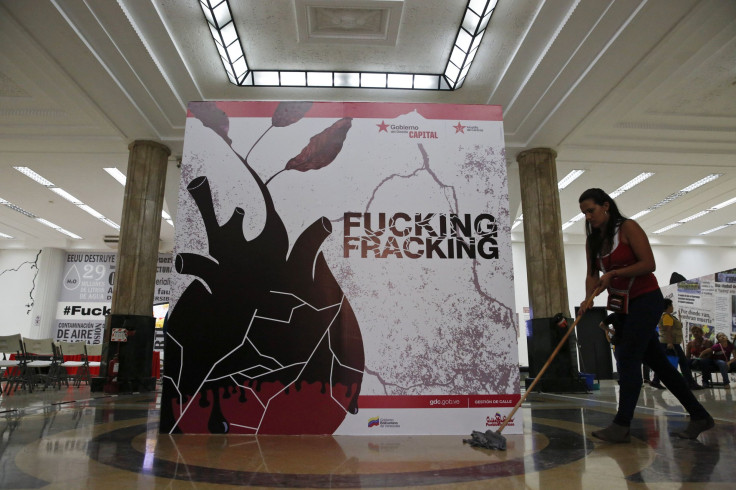Venezuela's New Exhibit On Hydraulic Fracturing Drops The F-Word On Fracking

Venezuela is not mincing words with a new Caracas exhibit outlining the environmental dangers of hydraulic fracturing, also known as fracking. The exhibit’s not-so-subtle title: “F------ Fracking, Fracturing the Earth.”
The exhibit, opened Monday by Venezuela’s federal district government, features interactive games, videos and images aimed at spurring a conversation on the environmental and political impact of fracking, a government press release said. It also takes clear jabs at the U.S. role in fracking’s rise.
“It’s an educational look at the phenomena of hydraulic fracturing, by which the U.S. government and energy companies have been exploiting our nature, caused damage to the earth’s crust and also knocked down oil prices with the geopolitical objective of harming Russia, Iran and Venezuela,” said Ernesto Villegas, head of the federal district government, according to government television broadcaster Venezolana de Televisión.
Villegas kicked off the exhibit’s opening with a panel discussion Monday afternoon, accompanied by Eulogio del Pino, president of the state-run oil company Petroleos de Venezuela S.A., Angel Gonzalez, the vice minister of hydrocarbons and energy, and other energy specialists.
The name of the exhibit is “unorthodox,” Villegas admitted. But he said the government wanted to give off a “shout that deserves to be heard” on the dangers of the practice.
“If this license we’ve taken allows some youths to wake up to what’s happening with this technology, it will have been worth the transgression with the name,” he said.
U.S. use of fracking and the boom in shale gas production has heightened optimism about the future of U.S. domestic energy production. But it has sparked an outcry among environmental groups, who say the extraction method -- by which engineers drill into rocks and inject chemicals to release natural gas -- poses risks of groundwater contamination, among other concerns.
Venezuela has the world’s largest proven oil reserves, which previously helped it cement its international economic relationships and earn its place in the Organization of the Petroleum Exporting Countries, or OPEC. But Venezuela has suffered from an overreliance on the petroleum industry: Oil makes up 95 percent of its exports, and the recent slide in global crude prices has put a heavy strain on Venezuela’s already cash-strapped economy.
Venezuelan President Nicolas Maduro has accused the United States and some of its allies of deliberately driving down the price of oil destabilize his government along with those of oil-dependent nations like Russia and Iran. Earlier this year Maduro traveled to Middle Eastern countries to try to persuade OPEC to cut oil production in an effort to drive prices back up, but that proved unsuccessful.
© Copyright IBTimes 2025. All rights reserved.






















